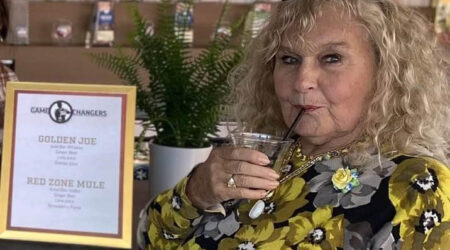We the New Romantics
A little over a year ago, in a car on our way to Monterey, I turned to my best friend all passionate and self-righteous and said, “You know what I understand even less than men? Women who give things up once they have men.” “How do you mean?” “You know, those girls who turn into […]
 A little over a year ago, in a car on our way to Monterey, I turned to my best friend all passionate and self-righteous and said, “You know what I understand even less than men? Women who give things up once they have men.”
A little over a year ago, in a car on our way to Monterey, I turned to my best friend all passionate and self-righteous and said, “You know what I understand even less than men? Women who give things up once they have men.”
“How do you mean?”
“You know, those girls who turn into domesticated, you-jump-I-jump kind of psychopaths who all of a sudden disappear from the realm of the social. Or put their boyfriends over their close friends. Or start doing crazy things like making sandwiches and baked goods, and doing laundry together. What the hell is that?”
She shrugged. “I don’t know, I think some of that’s natural.”
I scoffed. “I would never do that. No way. My best friend is my best friend, and she comes first because she was there before this Cro-Magnon guy was, and she’ll be there when he’s gone.”
“Thanks, man. But I think you might change your mind about this at some point.”
“Not a chance. And I can’t do the domestic thing, either. I think people should take care of themselves.”
“You never know, though. You might meet that guy who’s the perfect combination of bad-ass and smart-ass, with just the right amount of emotional maladjustment, and he’ll change your whole game plan.”
I shook my head (but may or may not have briefly fantasized about this fictitious guy and prayed begrudgingly for him to exist). “The guy doesn’t matter. I’m just not that type of sweet, sentimental, romantic person.”
And here, she grinned and start avoiding eye contact in that way she does where I know she’s sharing a joke with herself. “Jayne?”
“Yeah?”
“I can’t wait till you’re in love.”
Little did either of us know that her wish would be granted a mere three months later, after I switched jobs and dedicated myself to at least a year’s worth of post-undergraduate failure (something I’m starting to become quite successful at – woohoo?). One day I met a boy, and out of the flying rat’s blue nowhere this seemingly innocuous encounter became the catalyst for what would soon cause my trademark unrelenting cynicism to give way to some disgusting hearts-and-flowers disposition punctuated with giggles and shimmies (c’mon – it even sounds gross). And sometime in between my newfound attachment to my cell phone, my acquired habit of ordering an extra meal at restaurants to take to-go, and the sudden arrival of my ability to both create and tolerate the most adorably bizarre pet names in the history of the world, it occurred to me that I should give my best friend some credit for waiting until I was a month into my euphoria and buying a half-dozen cupcakes as a way to cure my man’s bad mood before saying what I know she’d been dying to say since I first gushed over a text message:
“Welcome to the dark side, Jayne.”
And I just smiled back like the idiot that I am, too busy contemplating frosting flavors to remember to be disgruntled. To hell with my pride – I was in love and I had the perma-smile sore cheeks to prove it. And while I certainly kept the aspects of my personality that made me distinctly me (namely my obvious and incurable distrust of all things, and my low tolerance for incompetence), I realized then how rewarding it is to able to call yourself a new Romantic, a lapsed sentimentalist who, instead of relapsing blindly, found a way to iron out all the naïve fantasies with a type of realism that doesn’t destroy any beauty.
Vaclav and Lena, the titular characters of Haley Tanner’s debut novel, make their own journey to new Romanticism. The novel’s opening chapters find the pair as mere children of immigrant parents, with Vaclav as an aspiring magician and Lena as his reliable assistant. Though initially drawn together by a shared disconnect with their new language and culture, what ultimately binds them to each other is their shared affinity and fascination with illusions, mysteries, and all things unexplainable – all of which are present in the act of loving and the experience of being in love as well. When Lena pulls a disappearing act and is suddenly absent from Vaclav’s life for the rest of his childhood and adolescence, Vaclav continues to nurture his affection for her, and his emphatic, classically Romantic hope that she’ll eventually come back withstands the test of reality so that when she does in fact reappear, she finds Vaclav exactly as she has left him. Whether this is a pleasant truth for her is one of the questions Tanner explores, along with whether love itself is but a complex illusion we perpetuate ourselves and veil in “truth.”
Wrought with magic, whimsy, and sharp, subtly dark humor, Vaclav and Lena suggests that what endures beyond the harsh realities and the misleading fantasies is dependent on cautious hope and guarded optimism for the best of possibilities. Tangible, universal truths are the illusions; our own truths, those we gather from our experiences and from our mistakes, are up to us, and are, really, the only things we need to belief in.
Vaclav believed he loved Lena – and so he did; on that vein, regardless of whether my own romance continued its euphoric streak, what will remain is the fact that it happened – that for a split second in the grand scheme of things my glass was neither half-empty nor half-full, but a glass that contained something I could drink, if I chose to. And boy did I.
Like she does with most things, my best friend put it best: “Love bit Jayne in the ass and in doing so proved its existence.”
And in case you were wondering, the pain is worth it.
by Jayne Wilson
Jayne Wilson writes fiction about the likes of decapitated gnomes, compulsive hoarders, and sardonic old men. She laughs pathetically at her own jokes and is generally an impish mess. She graduated from the University of California, Davis in 2010 with a degree in English-Creative Writing.





